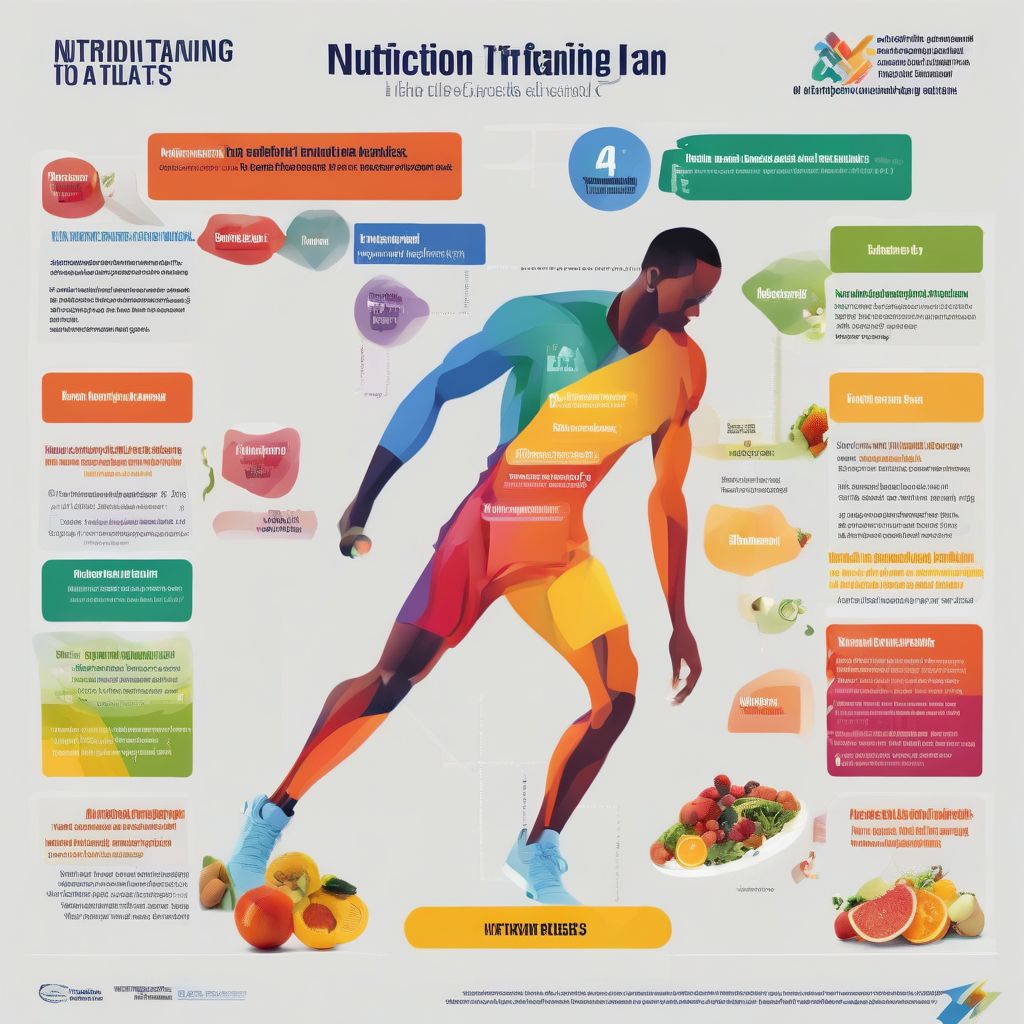Imagine this: you’re in the final stretch of your big race, fueled and energized, pushing past your limits with every stride. This isn’t just a dream; it’s the power of a well-designed sports nutrition plan. Whether you’re a seasoned athlete or just starting your fitness journey, understanding how to fuel your body correctly can make all the difference in your performance and recovery.
This comprehensive guide will break down the essential components of a winning sports nutrition plan, empowering you to unlock your full athletic potential.
Understanding Your Body’s Needs
Just like a car needs the right fuel to run smoothly, your body needs the proper nutrients to perform at its best. However, the type and quantity of these nutrients vary depending on several factors:
- Type of sport: Endurance sports like marathon running require a different nutritional approach than high-intensity activities like weightlifting or sprinting.
- Training intensity and duration: Longer, more intense workouts demand more calories and specific nutrients for sustained energy.
- Individual needs: Factors like age, gender, body composition, and pre-existing health conditions all play a role in determining your optimal nutrition plan.
 Nutrition plan for athletes
Nutrition plan for athletes
Building Your Plate for Performance: The Macronutrient Trio
Macronutrients – carbohydrates, proteins, and fats – are the building blocks of your diet and provide the energy needed for physical activity. Here’s how to fine-tune your intake:
1. Carbohydrates: Your Energy Powerhouse
- Role: Carbohydrates are your body’s primary fuel source, especially during high-intensity exercise. They break down into glucose, which is stored in your muscles as glycogen, ready to be used for energy.
- Recommended intake: Aim for 6-10 grams of carbohydrates per kilogram of body weight daily, adjusting based on your training schedule.
- Best sources: Focus on complex carbs like whole grains (brown rice, quinoa, oats), fruits, vegetables, and legumes.
2. Protein: The Building Block for Muscle Repair
- Role: Protein is essential for building and repairing muscle tissue, which is crucial for optimal athletic performance and recovery.
- Recommended intake: Aim for 1.2-2.0 grams of protein per kilogram of body weight daily, spreading your intake throughout the day.
- Best sources: Include lean protein sources such as chicken, fish, tofu, beans, lentils, Greek yogurt, and eggs in your diet.
3. Fats: Don’t Fear the Healthy Kind
- Role: While often demonized, healthy fats are vital for hormone production, cell function, and vitamin absorption. They also provide sustained energy, especially important for endurance activities.
- Recommended intake: Aim for 20-35% of your daily calories from healthy fats.
- Best sources: Incorporate sources like avocados, nuts, seeds, olive oil, and fatty fish (salmon, tuna) into your diet.
Micronutrients: The Unsung Heroes
While macronutrients provide the bulk of your energy, micronutrients (vitamins and minerals) are equally important for supporting various bodily functions:
- Iron: Crucial for oxygen transport to your muscles, a deficiency can lead to fatigue and reduced performance.
- Calcium and Vitamin D: Essential for strong bones, which are constantly challenged during physical activity.
- B Vitamins: Play a key role in energy metabolism, helping your body convert food into usable energy.
A balanced diet rich in fruits, vegetables, whole grains, and lean protein sources will generally provide adequate micronutrients. However, if you’re concerned about meeting your needs, consider consulting a registered dietitian for personalized advice.
Hydration: The Often Overlooked Performance Enhancer
Water is essential for life and even more crucial for athletes. It regulates body temperature, transports nutrients, lubricates joints, and removes waste products. Even mild dehydration can significantly impact your performance, leading to fatigue, muscle cramps, and decreased endurance.
- Recommended intake: Listen to your body and drink fluids consistently throughout the day, especially before, during, and after training sessions.
- Electrolyte replenishment: For longer, more intense workouts, consider sports drinks that contain electrolytes (sodium, potassium, magnesium) to replace those lost through sweat.
Timing is Everything: Fueling Your Workouts
- Pre-Workout: Consume a meal or snack containing carbohydrates and protein 1-3 hours before exercise to provide sustained energy.
- During Workout: For workouts lasting longer than 60 minutes, consume small amounts of carbohydrates and electrolytes to maintain energy levels and hydration.
- Post-Workout: Replenish your energy stores and kickstart muscle recovery by consuming a combination of carbohydrates and protein within 30-60 minutes after exercise.
Seeking Personalized Guidance: When to Consult a Sports Dietitian
While the information provided here serves as a general guideline, remember that individual needs can vary significantly. Consulting a registered sports dietitian is highly recommended if you:
- Have specific performance goals or dietary restrictions
- Need help creating a personalized nutrition plan
- Are experiencing digestive issues or other health concerns
Conclusion
Mastering your sports nutrition is an ongoing journey, constantly evolving with your fitness goals and training demands. By focusing on a balanced diet rich in whole foods, staying hydrated, and timing your meals appropriately, you’ll be well on your way to achieving optimal athletic performance. Remember, consistency is key – make gradual, sustainable changes to your eating habits, and you’ll reap the rewards both on and off the field.
Want to learn more about maximizing your athletic potential? Check out these articles on “How to Apply New Sports Science Research in Practical Settings” and “How to Use Strength and Conditioning to Boost Athletic Performance”. Your journey to peak performance starts now!
[amazon bestseller=”sports nutrition”]
